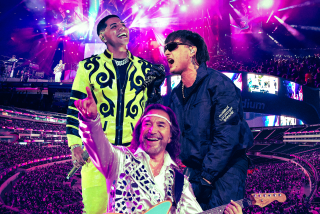Lessons in Time Management
- Share via
Would you pay hard-earned cash to see a show where opening acts such as Smash Mouth, Semisonic and Jimmie’s Chicken Shack got as much time to perform as headliners U2, the Rolling Stones and Radiohead?
That kind of democratic but inappropriate scheduling on the Watcha Tour’s stop at the Greek Theatre on Sunday was the main reason the highly touted rock en espan~ol festival ended up being a frustrating ordeal.
With 12 acts crammed into six hours, everyone played for about half an hour--major acts such as Cafe Tacuba and Molotov as well as virtual unknowns such as Viva Malpache and Puya.
Toward the end of the show you could sense a feeling of exhaustion in the audience. And although both Tacuba and Molotov were wildly applauded, their performances were too short to create an indelible impression.
Tacuba’s decision to participate in this package tour is puzzling. The Mexican quartet has co-headlined Greek-size theaters here in the past, so it doesn’t need the exposure some of the other Watcha bands are gaining. And the group has just released a double album, “Reves/Yosoy,” filled with some of the most mesmerizing material to ever grace Latin rock. Why not offer fans a full set at a smaller venue?
Only one song from the new record was included in the set. Listening to the electrifying “La Locomotora,” you could only sit and fume imagining what the rest of the new material would have sounded like live.
Facing a limited time Sunday, Tacuba opted to fall back on its earlier hits. And the energy and style of tunes such as “Chilanga Banda” and “Alarmala de Tos” demonstrated why the band is the most accomplished act in the genre.
For Molotov, on the other hand, half an hour was more than plenty. The most popular member of the burgeoning rap en espan~ol subgenre, the Mexican group is beginning to sound like a one-joke act.
Molotov’s pulsating sonic attack is arresting in its intensity. But the obscenities and misogynist references in the lyrics become tiresome after a while. At the end of the show, as the audience was on its feet gleefully chanting a Spanish expletive for homosexual, the scene didn’t make one worry so much about rock en espan~ol--rather the general state of Latin youth culture that deserves hard scrutiny.
Except for a soul-stirring performance by Argentina’s Bersuit Vergarabat, the other acts on the bill were of only occasional interest. In its strange, intense half-hour, the nine-piece band conveyed a palpable musical identity with dense, complicated songs that favored carnival rhythms such as the murga, throwing into the mix a brainy--if reactionary--political discourse.
Dressed in pajamas and sporting a shaved head and a long, gray goatee, singer Gustavo Cordera resembled a medieval jester out of an Ingmar Bergman movie. Before leaving the stage, he exposed his rear end to the crowd, and then complained about repression when the audience, predictably, booed.
But Vergarabat’s “Sr. Cobranza,” an unprecedented attack on Latin American government corruption, was one of the day’s highlights. Done at a slightly slower tempo than the studio version, it was enriched by a stunning electric piano solo that added lilting musicality to the incendiary message.
More to Read
The biggest entertainment stories
Get our big stories about Hollywood, film, television, music, arts, culture and more right in your inbox as soon as they publish.
You may occasionally receive promotional content from the Los Angeles Times.










